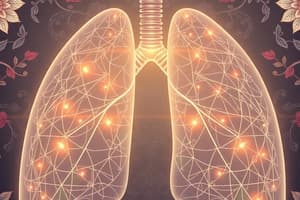Podcast
Questions and Answers
What is the average Tidal Volume (TV) of a healthy individual?
What is the average Tidal Volume (TV) of a healthy individual?
- 2500 mL
- 500 mL (correct)
- 8000 mL
- 1000 mL
The Expiratory Reserve Volume (ERV) is higher than the Inspiratory Reserve Volume (IRV).
The Expiratory Reserve Volume (ERV) is higher than the Inspiratory Reserve Volume (IRV).
False (B)
What drives the gas exchange in the alveoli?
What drives the gas exchange in the alveoli?
Simple diffusion
The average Expiratory Reserve Volume (ERV) is approximately ______ mL.
The average Expiratory Reserve Volume (ERV) is approximately ______ mL.
Match the following respiratory volumes with their definitions:
Match the following respiratory volumes with their definitions:
What is the function of the alveoli in the respiratory system?
What is the function of the alveoli in the respiratory system?
Residual volume is the amount of air that can be forcibly exhaled after normal breathing.
Residual volume is the amount of air that can be forcibly exhaled after normal breathing.
What is the average range of residual volume in the lungs?
What is the average range of residual volume in the lungs?
The total volume of air a person can expire after a normal inspiration is known as __________.
The total volume of air a person can expire after a normal inspiration is known as __________.
What directly affects the rate of diffusion of gases in the alveoli?
What directly affects the rate of diffusion of gases in the alveoli?
Match the respiratory volumes/capacities with their definitions:
Match the respiratory volumes/capacities with their definitions:
The partial pressure of carbon dioxide is higher in deoxygenated blood than in the alveoli.
The partial pressure of carbon dioxide is higher in deoxygenated blood than in the alveoli.
Functional Residual Capacity (FRC) is the volume of air that remains in the lungs after __________.
Functional Residual Capacity (FRC) is the volume of air that remains in the lungs after __________.
Flashcards
Tidal Volume (TV)
Tidal Volume (TV)
The volume of air inhaled or exhaled during a normal breath. It's approximately 500 mL.
Inspiratory Reserve Volume (IRV)
Inspiratory Reserve Volume (IRV)
The extra amount of air you can inhale after a normal breath by taking a deep breath.
Expiratory Reserve Volume (ERV)
Expiratory Reserve Volume (ERV)
The extra amount of air you can exhale after a normal breath by forcefully pushing out air.
Partial pressure
Partial pressure
Signup and view all the flashcards
Alveoli
Alveoli
Signup and view all the flashcards
Residual Volume (RV)
Residual Volume (RV)
Signup and view all the flashcards
Inspiratory Capacity (IC)
Inspiratory Capacity (IC)
Signup and view all the flashcards
Expiratory Capacity (EC)
Expiratory Capacity (EC)
Signup and view all the flashcards
Functional Residual Capacity (FRC)
Functional Residual Capacity (FRC)
Signup and view all the flashcards
Vital Capacity (VC)
Vital Capacity (VC)
Signup and view all the flashcards
Total Lung Capacity (TLC)
Total Lung Capacity (TLC)
Signup and view all the flashcards




